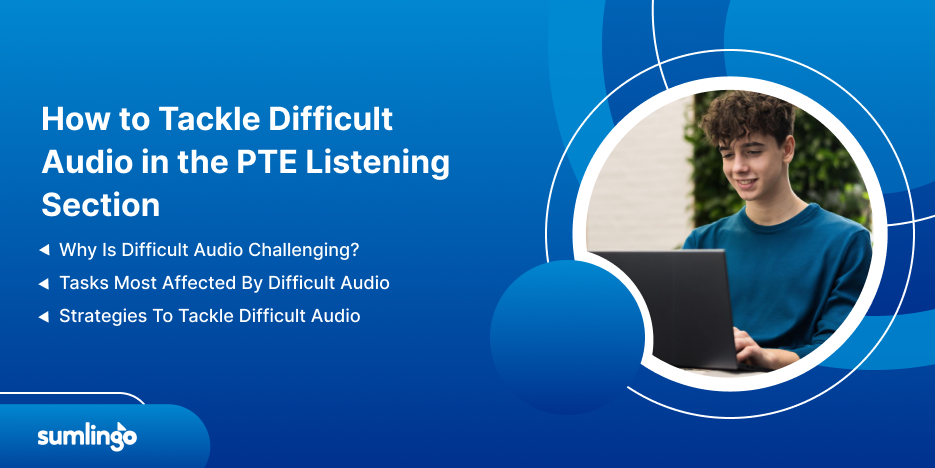The PTE Listening section is often one of the most challenging parts of the exam. Many test-takers struggle when the audio is fast, contains unfamiliar accents, or uses complex vocabulary. Tasks such as Summarize Spoken Text, Highlight Correct Summary, and Write from Dictation require not only listening but also quick comprehension, memory recall, and accurate writing. If you are unprepared for difficult audio, it can significantly affect your score.
Are you ready to test your skills?
Why is Difficult Audio Challenging?
There are several reasons why certain audio clips in the PTE exam can be difficult to understand:
- Fast Speech: When speakers talk quickly with minimal pauses, it can be hard to catch every word.
- Varied Accents: PTE includes a range of accents, including Australian, British, and non-native speakers. These can be unfamiliar and harder to follow.
- Complex Vocabulary and Sentence Structures: Academic or technical language, long sentences, and complex ideas can increase the difficulty.
- Background Noise or Poor Audio Quality: Sometimes, recordings are not very clear, which can make hearing the words correctly a challenge.
Understanding these challenges can help you approach your practice and exam with the right mindset.
Tasks Most Affected by Difficult Audio
Certain PTE Listening tasks are particularly sensitive to audio difficulty:
- Summarize Spoken Text: You must understand the main ideas and key details quickly to write an accurate summary. Missing or misunderstanding parts can lower your score.
- Write from Dictation: This task requires perfect spelling and word order. A single error can result in zero marks.
- Highlight Correct Summary: You need to correctly identify the summary that best matches the audio. Misunderstanding the content leads to wrong choices.
- Fill in the Blanks (Listening): You hear a sentence with missing words and must type the correct words exactly. Incorrect spelling or missing words means no points.
Important: Audio is present not only in the Listening section but also in many Speaking questions in the PTE exam. The difficulty students experience often depends on their overall language comprehension and familiarity with different accents and speech patterns.
Are you ready to test your skills?
Strategies to Tackle Difficult Audio
1. Use Authentic Listening Materials
Practicing with real-life English audio helps you get used to natural speech patterns, accents, and vocabulary. Some excellent sources include:
- TED Talks: These are great for practicing listening to formal presentations, identifying main arguments, and noticing how speakers transition between points.
- News Clips: Listening to news helps you practice extracting key information quickly.
- Podcasts and Documentaries: These expose you to various accents and speaking speeds.
When you practice, focus on active listening. This means you should take notes, write summaries, and try to repeat or paraphrase what you hear rather than just letting the audio play in the background.
2. Simulate PTE Tasks During Practice
Rather than only passively listening, try to simulate exam conditions:
- After listening to a short clip (30 seconds to 1 minute), pause and write a summary or answer questions.
- Practice writing from dictation by transcribing audio clips.
- Try filling in blanks with missing words you hear in recordings.
This active practice will train your brain to respond quickly and accurately under time pressure.
3. Get Familiar with Different Accents
Don’t limit yourself to American English or your native accent. The PTE exam features a mix of Australian, British, and non-native accents. To improve your adaptability:
- Listen to Australian news channels such as ABC.
- Watch British documentaries or educational videos.
- Use mixed-accent podcasts to expose yourself to various pronunciations.
This diversity will prepare you to understand any accent in the exam.
4. Review and Reflect on Your Practice
Listening alone is not enough. Always check your answers against transcripts or official materials. This helps you identify:
- Words or phrases you commonly mishear.
- Spelling or grammar errors you tend to make.
- Areas where your comprehension is weaker.
Replay difficult sections multiple times until you are confident in your understanding.
Common Mistakes to Avoid
| Mistake | Why It Hurts | How to Fix It |
| Passive listening without engagement | You don’t practice key skills like summarizing | Take notes, summarize aloud or in writing |
| Practicing only one accent | You get confused by other accents on exam day | Include a variety of accents in practice |
| Not checking answers or transcriptions | You don’t realize what you misunderstood. | Compare answers with transcripts or scripts |
| Random listening without task alignment | You miss developing task-specific strategies | Practice audio that matches PTE question types |
| Repeating mistakes without feedback | Your errors become habits, lowering your score. | Get feedback from teachers or study partners |










